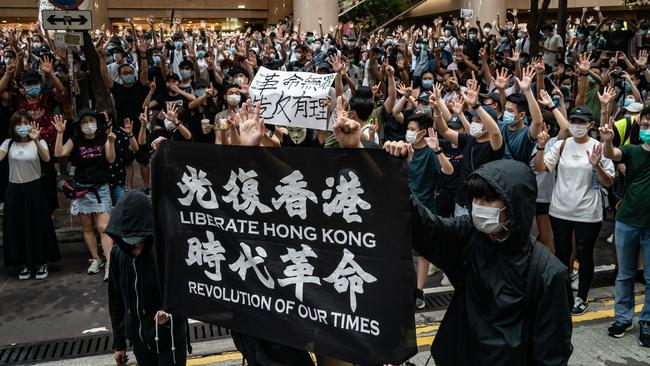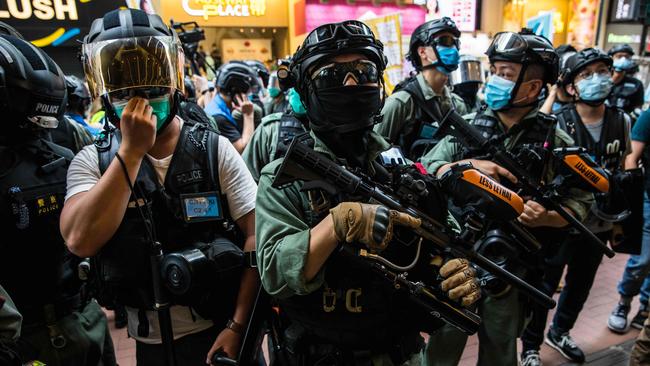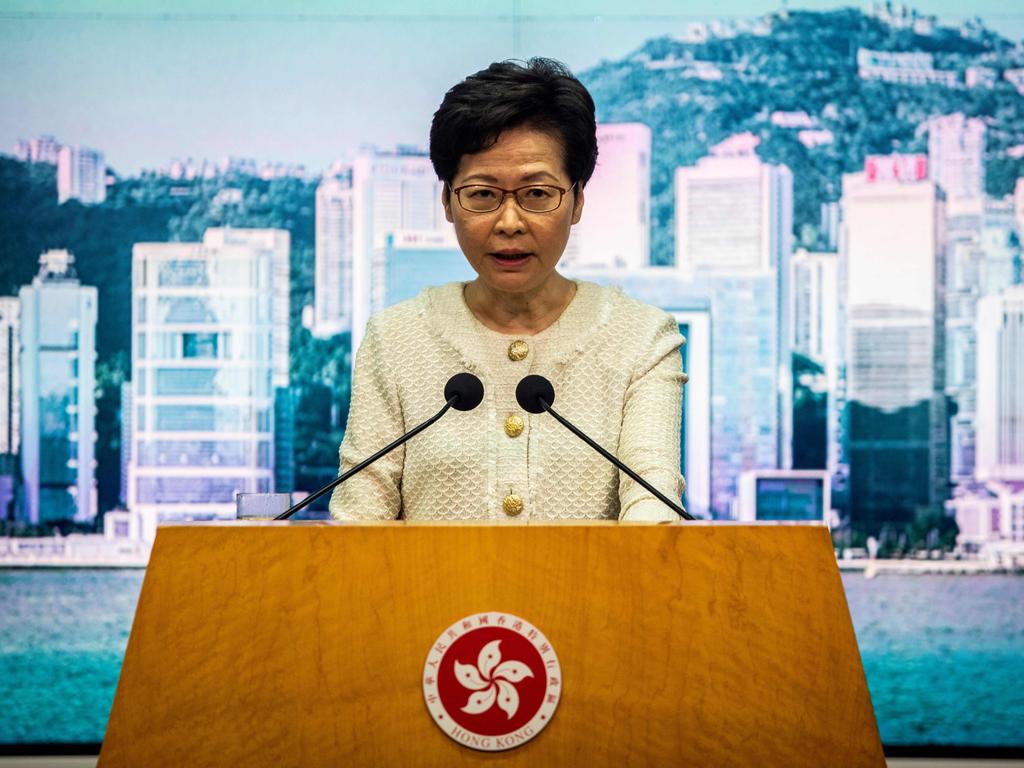Why we need to take a stand against Beijing’s bullying
There has been a sea change in our relations with China but Australia is right to offer asylum to Hongkongers.

What a week it has been in our relations with China: the new defence update; the travel warning; the statement by Scott Morrison on visas and openings for Hongkongers seeking escape from China’s draconian rule; and now the suspension of our extradition treaty with Hong Kong.
Those who have been arguing for years that we should nestle under Beijing’s wing and distance ourselves from the US must be feeling the heat a bit.
The federal government has even advised the 100,000 Australians who work in Hong Kong that they might want to consider moving elsewhere or relocating to our friendly shores. Britain and Canada are taking similar steps.
This is all a sea change in our relations with the Party’s Republic of China, where no one is free to criticise the government and even the image of and name of Winnie-the-Pooh is censored because it had been used to lampoon President Xi Jinping.
All these steps have been taken and announced by the Morrison government in a dignified and principled manner. They are warranted. Xi’s China has become a global bully and a regional menace. Beijing has taken all these announcements badly, of course, doubtless annoyed that its decades of influence operations are coming to nothing and that the tables are being turned. But all this is just the beginning. The “cold war” China denounces is of its own making. It’s a cold war of ideas and we must win it at the expense of Xi Jinping Thought.
For all these reasons, Australians travelling to China, including Hong Kong, face unprecedented risks. Xi’s six-year-long Operation Fox Hunt, in which his agents have been tracking and intimidating hundreds of Chinese emigres on all manner of grounds inside Western countries, is characteristic of how the regime works.
The new national security law in Hong Kong is of a piece with that brutal modus operandi. Fox Hunt is about Chinese expatriates. But the new Hong Kong law makes it clear that you’re no longer safe just because you’re a “round-eye”.
Increasingly, traveller, you risk being accused of treading on Xi’s China Dream and finding yourself caught up in a nightmare.

Yang Hengjun, Australian academic and China dissident, was incautious enough to venture back on to the Chinese Communist Party’s turf last year. He is in prison on charges of espionage. Take care lest this happen to you because the new law is so sweeping that you are at risk even if you exercise normal standards of free speech and association.
In its starkest form, the Department of Foreign Affairs and Trade warning is that Australians may be at risk of arbitrary detention on national security grounds. The Chinese authorities have detained and increasingly are threatening to detain foreigners, not only Chinese citizens, on the grounds that they are allegedly “endangering national security”.
That “national security” is now so broadly interpreted and Chinese judicial practices so opaque and arbitrary that the risk to our citizens stepping on to Chinese territory has just gone up a notch.
Chinese Ministry of Foreign Affairs spokesman Zhao Lijian objects that his government “always protects the safety and legitimate rights and interests of foreign nationals in China” and that Australians have no reason to fear travelling to China “provided they abide by laws and regulations”.
The problem, however, is precisely China’s laws and regulations. The CCP is a law unto itself and there is no due process. You can be arrested and held without charge or redress for years. Habeas corpus does not apply. This has long been true. It is accentuated now for Australians by several further considerations.
First, relations between the two countries have gone into deep freeze because of Xi’s umbrage at our call for an independent inquiry into the origins, in Wuhan, of the devastating pandemic that’s ravaging the world. That tension is ongoing and former New Zealand prime minister Helen Clark, as co-chair of the World Health Organisation investigation, has her work cut out for her getting to the bottom of the matter.
Second, the long cycle of protests in Hong Kong against the stifling of democracy there has led to the draconian national security law directed at “subversion” and foreign influence.
But third, Beijing’s state-controlled press has been drumming up accusations of an Australian espionage “offensive” and calling for a “crackdown” against it. Where are Kevin Rudd and Bob Carr to cry “McCarthyism” with this kind of thing happening in China?
Altogether, this is as ominous as anything coming out of China since the bad old days of Mao Zedong, or perhaps the immediate aftermath of the Tiananmen Square massacre in June 1989.
Yet Zhao calls on Australia to “look at the national security legislation in Hong Kong in a correct and objective light, stop interfering in China’s internal affairs … and refrain from going further down the wrong path”. In an objective light, the wrong path now would be to appease Beijing. Our government, correctly, has refrained from doing so.
The Hong Kong national security law does need to be seen in this correct and objective light. Its key provisions, from an Australian viewpoint, are chapter six, The Scope of Application, articles 36, 37 and 38, which stipulate (emphases added):
“an offence shall be deemed to have been committed in Hong Kong if an act constituting the offence or the consequence of the offence occurs either there or on board a vessel or aircraft registered there (36),
“The law will apply to permanent residents of Hong Kong or a company or organisation set up in Hong Kong, even if the offence is committed outside Hong Kong (37); and
“It will apply to offences committed outside Hong Kong even by those who are not permanent residents of Hong Kong (38).”
This would be disturbing even if there were a legal system in China based on due process. That there isn’t is the core problem.
Article 20 makes clear that any kind of activity, slogan or statement bearing on human rights in China, the state of affairs in Tibet, the treatment of the Uighurs, the persecution of Falun Gong, the call for democratisation in Hong Kong, the status of Taiwan or the CCP dictatorship in China can be deemed subversive and lead to detention and imprisonment. Offences under a very wide and vaguely defined set of issues can incur life imprisonment for “a principal offender” and 10 years for others.
Articles 12 and 13 stipulate that the chief executive, Carrie Lam, will head a new Committee for Safeguarding National Security, under which will sit a secretariat headed by a secretary-general appointed by Beijing on the recommendation of the chief secretary. Article 14 stipulates that no institution, organisation or individual in Hong Kong will be allowed to interfere with the work of the committee. Information relating to its work will not be subject to disclosure, nor will decisions made by it be open to judicial review.
In short, the committee will be a secretive Star Chamber — specified in article 18 — directly accountable to Beijing but in no way accountable to the people of Hong Kong. Prosecutions will be undertaken at the sole discretion of that Star Chamber and may include even those outside Hong Kong who are not permanent residents there. No wonder we have suspended our extradition treaty under these circumstances.
Melbourne-based Chinese artist and dissident Badiucao has dubbed Beijing’s newly appointed policing strongman Zheng Yanxiong a tactless bullyboy liable to resort to violence and “ruin Hong Kong”. Both passage of the law, appointment of the committee and the arrival of boss Zheng presage this ruin. There cannot be an extradition treaty with a territory run on such lines. It no longer operates under the British tradition of common law and civil rights. It is no longer “Hong Kong”.
Indicative of what is in store in Hong Kong is the recent arrest of Beijing law professor Xu Zhangrun for publishing an essay accusing the CCP of “ruling tyrannically” and mishandling the COVID-19 outbreak. He was right, of course. It does and it did.
The regime will arrest you for writing or saying, perhaps even for reading or retweeting, such things, to say nothing of assembling with others in public to declare them.
Xu wrote that China is “led by one man only, but this man is in the dark and rules tyrannically, with no method for governance, though he is skilled at playing with power, causing the entire country to suffer”. That suffering has swallowed up Hong Kong. It threatens all of us.
Joshua Wong, prominent among the democracy protesters since 2014, is a target of the new law. His activism was sparked by PRC-inspired indoctrination in Hong Kong schools in 2014. Article 10 of the new law enshrines such indoctrination as a core responsibility of the Hong Kong authorities.
Wong’s book Unfree Speech: The Threat to Global Democracy and Why We Must Act, Now was published shortly before the hammer fell in Hong Kong. Now it will be banned there. If you think like him, or even communicate with people who sympathise with him, watch out.
If you’re Antony Dapiran, Australian lawyer in Hong Kong and author of City on Fire: The Fight for Hong Kong, or if you carry his book in your baggage on arrival in Hong Kong, watch your step. You are treading on Xi’s toes — and he kicks like a mule. Be warned.
In all these circumstances, should we be offering a refuge to those fleeing Xi’s Hong Kong dread zone? Absolutely. Will that incur Beijing’s displeasure? Yes, it will. That can’t be avoided. The party with the Party is over. It’s time for a sober national security strategy.
Paul Monk is the author of Thunder From the Silent Zone: Rethinking China (2005) and Dictators and Dangerous Ideas (2018), among other books.







To join the conversation, please log in. Don't have an account? Register
Join the conversation, you are commenting as Logout